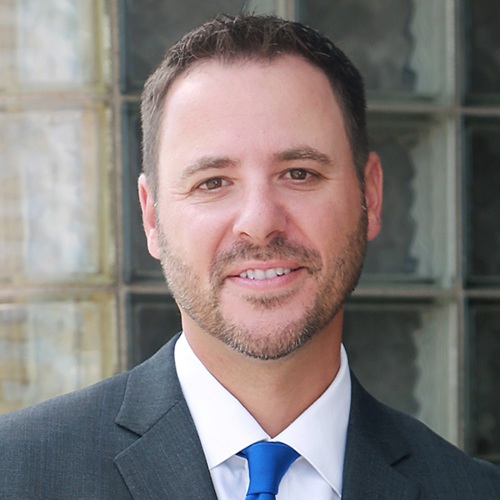Potential Trouble for Retirees: A Wealth Adviser's Guide to the OBBB's Impact on Retirement
While some provisions might help, others could push you into a higher tax bracket and raise your costs. Be strategic about Roth conversions, charitable donations, estate tax plans and health care expenditures.


Profit and prosper with the best of Kiplinger's advice on investing, taxes, retirement, personal finance and much more. Delivered daily. Enter your email in the box and click Sign Me Up.
You are now subscribed
Your newsletter sign-up was successful
Want to add more newsletters?

Delivered daily
Kiplinger Today
Profit and prosper with the best of Kiplinger's advice on investing, taxes, retirement, personal finance and much more delivered daily. Smart money moves start here.

Sent five days a week
Kiplinger A Step Ahead
Get practical help to make better financial decisions in your everyday life, from spending to savings on top deals.

Delivered daily
Kiplinger Closing Bell
Get today's biggest financial and investing headlines delivered to your inbox every day the U.S. stock market is open.

Sent twice a week
Kiplinger Adviser Intel
Financial pros across the country share best practices and fresh tactics to preserve and grow your wealth.

Delivered weekly
Kiplinger Tax Tips
Trim your federal and state tax bills with practical tax-planning and tax-cutting strategies.

Sent twice a week
Kiplinger Retirement Tips
Your twice-a-week guide to planning and enjoying a financially secure and richly rewarding retirement

Sent bimonthly.
Kiplinger Adviser Angle
Insights for advisers, wealth managers and other financial professionals.

Sent twice a week
Kiplinger Investing Weekly
Your twice-a-week roundup of promising stocks, funds, companies and industries you should consider, ones you should avoid, and why.

Sent weekly for six weeks
Kiplinger Invest for Retirement
Your step-by-step six-part series on how to invest for retirement, from devising a successful strategy to exactly which investments to choose.
The One Big Beautiful Bill (OBBB), signed into law in July, made headlines with promises of tax relief and economic growth. But for retirees, the reality is more complicated and, in many cases, more costly.
While the law extends some favorable tax brackets and introduces deductions for older Americans, several provisions do little to support people already in retirement.
Others could quietly raise your costs or trigger unintended tax consequences if you're not careful.
From just $107.88 $24.99 for Kiplinger Personal Finance
Become a smarter, better informed investor. Subscribe from just $107.88 $24.99, plus get up to 4 Special Issues

Sign up for Kiplinger’s Free Newsletters
Profit and prosper with the best of expert advice on investing, taxes, retirement, personal finance and more - straight to your e-mail.
Profit and prosper with the best of expert advice - straight to your e-mail.
Kiplinger's Adviser Intel, formerly known as Building Wealth, is a curated network of trusted financial professionals who share expert insights on wealth building and preservation. Contributors, including fiduciary financial planners, wealth managers, CEOs and attorneys, provide actionable advice about retirement planning, estate planning, tax strategies and more. Experts are invited to contribute and do not pay to be included, so you can trust their advice is honest and valuable.
If you're retired (or preparing to retire) here's how the new law might affect your finances and what steps to take to protect yourself.
Roth conversions could now do more harm than good
Roth conversions used to be a smart way to control future taxes. With today's lower rates, many retirees converted pretax IRA funds to Roth accounts to lock in those rates and enjoy tax-free growth.
But under the OBBB, this strategy is no longer a slam dunk. Why?
- The new bonus deduction for people 65 and older lowers taxable income, but not adjusted gross income (AGI).
- Roth conversions increase AGI, which determines how much of your Social Security is taxed and whether you'll face IRMAA surcharges on Medicare.
- Some retirees now face a "sneak attack," in which they stay in the same tax bracket, but pay thousands more in Medicare premiums or lose Social Security purchasing power due to added taxation.
What to do: Don't abandon Roth conversions altogether, but be precise. Smaller partial conversions spaced out over several years could help you reduce lifetime taxes without triggering costly ripple effects.
Be sure to run multiyear tax projections that include Social Security taxation and IRMAA thresholds.
It's also a smart idea to calculate your future required minimum distributions (RMDs) at and after age 73.
If those RMDs are projected to push you into the 24% bracket, consider converting enough now to maximize the 22% bracket while you still can.
We don't know what future tax rates will be, but paying taxes now at known rates might be smarter than waiting.
If you're unsure where you stand, get help from an advisor who uses software that models potential long-term tax savings from conversions under current law, which can be a powerful tool for retirement decision-making.
The estate tax exemption rose, but don't let that fool you
The bill raises the federal estate tax exemption to $15 million per person through 2030, but for the majority of retirees, this does nothing to ease the burden of estate clarity, tax efficiency or family coordination.
Unfortunately, many people assume that if they're under the estate tax limit, they don't need to plan. That's a mistake.
Most estate planning issues have nothing to do with taxes and everything to do with:
- Unclear or outdated beneficiary designations
- No instructions for incapacity or health care decisions
- Family disputes about property, debt or inheritance
- Missed charitable or legacy goals
What to do: Revisit your estate plan, regardless of your net worth. A current will, power of attorney, health care directive and coordinated beneficiary structure are essential.
If you're charitably inclined, consider using a qualified charitable distribution (more about this below), or setting up a donor-advised fund (DAF). A DAF allows you to donate a large sum in a high-income year.
For example, if you're converting a large amount to a Roth, you can offset the tax impact while maintaining flexibility in how you give over time.
Medicare cuts might raise your out-of-pocket costs
To fund permanent tax cuts, the OBBB includes more than $490 billion in Medicare reductions in the next decade.
The law doesn't spell out exactly how those cuts will be implemented, but they could result in:
- Higher Part B and D premiums
- Reduced coverage areas for Medicare Advantage plans
- Lower provider reimbursements that make it harder to find care
- More out-of-pocket expenses for medications or specialist visits
What to do: Plan for rising health care costs, even if your income stays flat. Review your supplemental coverage annually, and don't assume your plan from last year will still serve you next year.
Consider building a dedicated health care reserve into your retirement income strategy.
Charitable giving incentives are nice, but not a game-changer
The OBBB includes a new $2,000 charitable deduction for non-itemizers age 65 and older. That's a welcome change, but it might not move the needle much, especially for those who already use qualified charitable distributions (QCDs) from IRAs for tax-efficient giving.
What to do: If you're age 70½ and older and have an IRA, QCDs remain one of the most powerful giving tools available, allowing you to reduce your RMD income and support causes you care about — all without increasing your AGI.
For more flexibility, combine your giving with a donor-advised fund. This can be especially effective if you're doing Roth conversions or realizing gains in a single year and want to offset that added income.
Income stacking could trigger tax surprises
The OBBB keeps lower income tax brackets, but those brackets still interact with other parts of the tax code in ways that can sneak up on retirees. For example:
- RMDs stack on top of other income
- Capital gains could become taxable when layered with dividends, pensions or Social Security
- You could unintentionally cross into a higher effective tax rate even if your marginal bracket doesn't change
What to do: Be intentional about withdrawal sequencing. In some years, it might make sense to draw from Roth accounts to stay under Medicare or tax thresholds. In others, you could realize capital gains up to the 0% tax rate.
Looking for expert tips to grow and preserve your wealth? Sign up for Building Wealth (soon to be called Adviser Intel), our free, twice-weekly newsletter.
Consider using tax-efficient investments in your non-qualified (taxable) accounts.
By focusing on low-turnover funds, municipal bonds or actively managed portfolios with tax-loss harvesting strategies, you might reduce your annual tax liability while keeping more of your investment income.
The bottom line
The OBBB might have promised sweeping relief, but for retirees, it offers more caution than comfort.
The next few years will require sharper planning, not just to avoid tax surprises, but to build in flexibility for rising health care costs, shifting income needs and legacy goals.
The good news? You still have time to make smart moves that can protect your future. Work with a financial professional who understands how today's rules impact retirement and how to adjust as things evolve.
At Dorhout Retirement Services, we help people retire with clarity and confidence, even when the rules change. If you're unsure how this new legislation affects your income, taxes or estate, we're here to help.
Grant Dorhout offers investment advisory services through CWM, LLC, an SEC Registered Investment Adviser. This article is not intended to provide specific legal, tax, or other professional advice.
For a comprehensive review of your personal situation, always consult with a tax or legal adviser.
Converting from a traditional IRA to a Roth IRA is a taxable event.
Generally, a donor-advised fund is a separately identified fund or account that is maintained and operated by a section 501(c)(3) organization, which is called a sponsoring organization. Each account is composed of contributions made by individual donors. Once the donor makes the contribution, the organization has legal control over it. However, the donor, or the donor's representative, retains advisory privileges with respect to the distribution of funds and the investment of assets in the account. Donors take a tax deduction for all contributions at the time they are made, even though the money may not be dispersed to a charity until much later.
Related Content
- What the OBBB Means for Social Security Taxes and Your Retirement: A Wealth Adviser's Guide
- Seven Medicare Changes Coming in 2026
- Top Four Retirement Withdrawal Strategies to Maximize Your Savings
- Five Under-the-Radar Shifts Investors and Job Seekers Can't Afford to Ignore Under the OBBB
- How to Maximize Your Social Security Now That the One Big Beautiful Bill Is Law
Profit and prosper with the best of Kiplinger's advice on investing, taxes, retirement, personal finance and much more. Delivered daily. Enter your email in the box and click Sign Me Up.

Grant is the founder of Dorhout Retirement Services and is committed to helping retirees of Omaha and surrounding cities thrive in retirement. He's been helping retirees and pre-retirees retire with confidence since 2005. His Discover How To Thrive In Retirement process puts a focus on making sure his clients have a plan that works in all circumstances, not just ideal ones. That is why Grant is so passionate about teaching those in his community about the importance of retirement planning.
-
 Quiz: Do You Know How to Avoid the "Medigap Trap?"
Quiz: Do You Know How to Avoid the "Medigap Trap?"Quiz Test your basic knowledge of the "Medigap Trap" in our quick quiz.
-
 5 Top Tax-Efficient Mutual Funds for Smarter Investing
5 Top Tax-Efficient Mutual Funds for Smarter InvestingMutual funds are many things, but "tax-friendly" usually isn't one of them. These are the exceptions.
-
 AI Sparks Existential Crisis for Software Stocks
AI Sparks Existential Crisis for Software StocksThe Kiplinger Letter Fears that SaaS subscription software could be rendered obsolete by artificial intelligence make investors jittery.
-
 Quiz: Do You Know How to Avoid the 'Medigap Trap?'
Quiz: Do You Know How to Avoid the 'Medigap Trap?'Quiz Test your basic knowledge of the "Medigap Trap" in our quick quiz.
-
 5 Top Tax-Efficient Mutual Funds for Smarter Investing
5 Top Tax-Efficient Mutual Funds for Smarter InvestingMutual funds are many things, but "tax-friendly" usually isn't one of them. These are the exceptions.
-
 Why Invest In Mutual Funds When ETFs Exist?
Why Invest In Mutual Funds When ETFs Exist?Exchange-traded funds are cheaper, more tax-efficient and more flexible. But don't put mutual funds out to pasture quite yet.
-
 We Retired at 62 With $6.1 Million. My Wife Wants to Make Large Donations, but I Want to Travel and Buy a Lake House.
We Retired at 62 With $6.1 Million. My Wife Wants to Make Large Donations, but I Want to Travel and Buy a Lake House.We are 62 and finally retired after decades of hard work. I see the lakehouse as an investment in our happiness.
-
 Social Security Break-Even Math Is Helpful, But Don't Let It Dictate When You'll File
Social Security Break-Even Math Is Helpful, But Don't Let It Dictate When You'll FileYour Social Security break-even age tells you how long you'd need to live for delaying to pay off, but shouldn't be the sole basis for deciding when to claim.
-
 I'm an Opportunity Zone Pro: This Is How to Deliver Roth-Like Tax-Free Growth (Without Contribution Limits)
I'm an Opportunity Zone Pro: This Is How to Deliver Roth-Like Tax-Free Growth (Without Contribution Limits)Investors who combine Roth IRAs, the gold standard of tax-free savings, with qualified opportunity funds could enjoy decades of tax-free growth.
-
 One of the Most Powerful Wealth-Building Moves a Woman Can Make: A Midcareer Pivot
One of the Most Powerful Wealth-Building Moves a Woman Can Make: A Midcareer PivotIf it feels like you can't sustain what you're doing for the next 20 years, it's time for an honest look at what's draining you and what energizes you.
-
 Stocks Make More Big Up and Down Moves: Stock Market Today
Stocks Make More Big Up and Down Moves: Stock Market TodayThe impact of revolutionary technology has replaced world-changing trade policy as the major variable for markets, with mixed results for sectors and stocks.